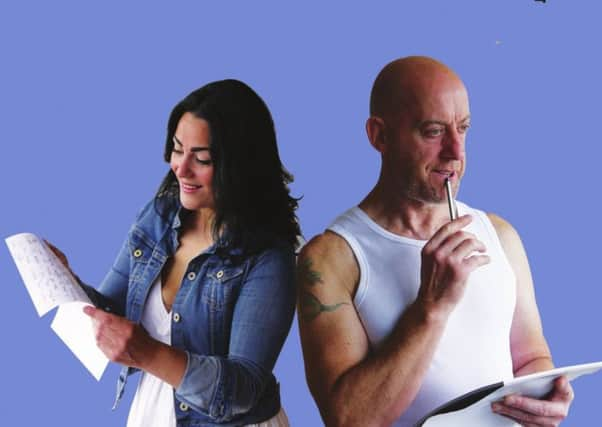Jailmates tries to believe that love can transcend any obstacle


How real is a romantic relationship if it begins with one of the participants behind bars? That’s the intriguing question posed by two new Fringe plays, drawing on the genuine experiences of prisoners in Scotland and the US and the women who write to them.
With some irony, Gary Little does a stand-up routine about trying to keep his time in prison quiet. Not only is the comedian happy to joke about his incarceration, he also stars in Jailmates and its forthcoming BBC Radio Scotland adaptation. What’s more, the routine in question suggests that these days, the Glaswegian’s fall from grace makes him a compelling dinner party draw for the chattering classes.
Advertisement
Hide AdAdvertisement
Hide AdWritten and performed consecutively by Little and his fellow stand-up Julia Sutherland, in much the same manner as their characters’ epistolary back-and-forth, Jailmates is the tale of Gerry, serving 18 months for stealing books and selling them online, and Jenny, a divorcee and mother-of-one, trapped in her own suburban loneliness, who starts writing to him.
Having previously served a term in Barlinnie for drug offences, in 2008 Little was sent to the open prison Castle Huntly for selling £50,000 worth of books that were due to be pulped, which he’d stolen while working for HarperCollins. The production incorporates countless elements lifted directly from his experiences, with the married Sutherland’s frustrations (marginally) more fictionalised.
“People are used to hearing about the violence and clichéd bad stuff about the jail,” he notes. “And I know there’s nothing especially new in this. You sort of know they’ll get together. But you want to see how. What are the logistics?”
Jailmates is especially playful about the class clash, with well-read Gerry reflecting Little’s jest that “unlike a lot of people in the jail that are just bams, I was a cut above…” “A cultured bam,” Sutherland laughs.
Strikingly, “Gerry in prison has more freedom than Jenny outside,” producer Richard Melvin says. “She’s trapped in a domestic situation, trapped into motherhood, trapped by the expectations of her parents, child and society. Whereas Gerry’s going to yoga and doing Greek philosophy classes.”
There are echoes of Cyrano de Bergerac too, in that Little actually wrote to and romanced one poor woman on behalf of his illiterate and terrifying cellmate – “telling her he was just back from the gym when he was a junkie” – a storyline set to feature in the radio series. However, some aspects of his time inside were too unlikely or sobering to include.
“These women love the fact that they’re writing to a guy and they know where he is, that he’s going to write nice stuff back. Because often, he just wants the filth, some dirty stuff. It’s quite selfish on his part.
Advertisement
Hide AdAdvertisement
Hide Ad“But for the women, who even writes letters any more? ‘Hi baby, I’m missing you. I can’t wait to see you’. Whatever the situation, that’s a big wash of positivity.”
Sutherland suggests that the physical obstructions act in much the same way as “boy bands fulfil a deep psychological need in teenage girls to safely explore their feelings”, prompting the unlikely image of 6ft 2in bald, fifty-something Little as a teenybopper icon.
Regrettably, fantasies can turn sour when reality intrudes. Little had been in contact with a woman from Inverness, even speaking to her on the phone. But when she sent a photo, “I knew I couldn’t keep writing to her. And I felt so guilty, like I was letting her down. It was weird because I was in jail, it wasn’t like I was a catch. But there I was, stuck in my cell, telling myself I had to move on.”
Stephanie Ridings also experienced an ethical dilemma in the course of researching The Road To Huntsville, in which she plays a British woman corresponding with a man on death row in Texas. After travelling to the state penitentiary and encountering the townspeople of Huntsville, a former warder and even the family of a prisoner being executed, she wrote the one-woman piece in which she too plays a version of herself. Wary of being seen as a grief tourist, she’d asked herself: “How far should a writer go to get the story? If I started writing to someone on death row, would I tell them I was researching this or would I simply say I’m looking for a penpal?”
Fortunately, her decision was eased by the wealth of testimony from prison correspondents online, assisting her in forging a believable relationship between Stephanie and her imaginary inmate, Jonny, which Ridings describes as “perhaps 80 per cent truth”.
She points out that some of those writing letters are doing so without romantic intentions and simply offering support through organisations like Amnesty International. But the play explores various possibilities, including that a death-row inmate “can seem a safe relationship if they’ve suffered a history of abuse”.
Some psychological traits recurred in her research, such as a strict Catholic upbringing or hybristophilia, a sexual attraction to someone who’s committed a terrible crime.
Advertisement
Hide AdAdvertisement
Hide AdFor herself, Ridings believes that there’s often projection, manipulation and ulterior motives on both sides of the prison wall. But sometimes “people are genuinely in love and will take their relationship further,” she adds, while declining to reveal the play’s conclusions.
Texan jails can keep death row inmates in solitary confinement for up to 23 hours a day. But Ridings reckons The Road to Huntsville still has relevance to debates about UK prisoners’ rights, arguing that “the things that we don’t want to talk about are often the things that we should be talking about the most”.
Besides, as Melvin remarks of Jailmates: “Ultimately, this is a love story and we want to believe that love can transcend race, class, personal history, anything.”
Jailmates, New Town Theatre, until 15 August. Today, 5pm. The Road to Huntsville, Summerhall, until 28 August. Today, 8:45pm